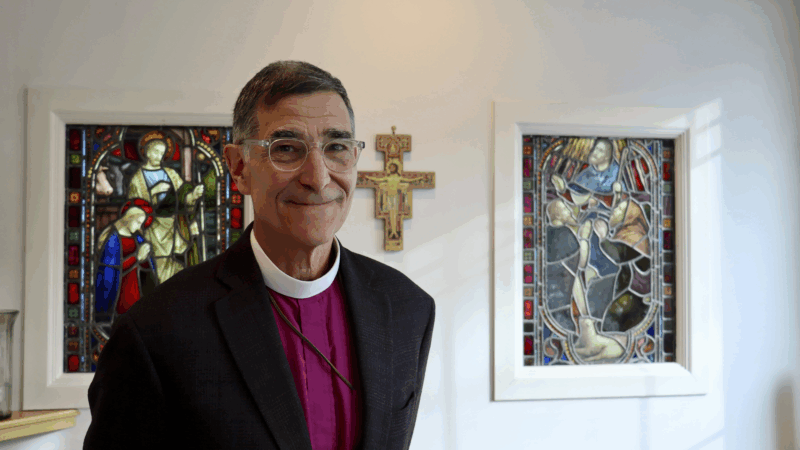Peruvian farmer goes head to head with German energy giant in climate test case
LIMA, Peru — A landmark climate lawsuit opens in a German court Monday, as a Peruvian farmer sues a German energy giant over the threat to his home from a mountain lake overflowing with glacier meltwater.
Saul Luciano Lliuya, 45, lives in Huaraz, a city in Peru’s central Ancash region, in the heart of the Peruvian Andes. It lies more than a mile below Palcacocha, a high altitude lake that is brimming with 35 times more water than usual. Peru is home to 70% of the worlds tropical glaciers — but they are disappearing rapidly.
Should it burst its banks, Palcacocha’s waters would ‘likely wipe away Lliuya’s home, as well as the homes of an estimated 50,000 other people living in and around Huaraz, potentially with them inside.
In response, Lliuya is using a German property law more normally wielded against anti-social neighbors to target RWE, a power company whose coal-powered energy plants make it one of Europe’s largest emitters of greenhouse gases.
With the support of Germanwatch, a local nonprofit, Lliuya has calculated that since it began operating in 1898, RWE has accounted for 0.47% of all human-generated carbon emissions. Lliuya is therefore asking for 0.47% of the cost, roughly $18,000, of building a dyke that would protect him and Huaraz from a catastrophic breaching of Palcacocha’s banks.
The case is the culmination of a near 10-year legal battle for Lliuya, and is the first to be heard of nearly 50 similar climate civil claims in different nations around the world — including one brought by the city and county of Honolulu, Hawaii, against Chevron, ExxonMobil, BP, Shell and other oil giants.
Although its verdict might not be binding on other jurisdictions, the case does provide a legal template with many other countries, including the United States, having similar property legislation.
RWE, which has never operated in Peru, denies legal responsibility. It argues climate change is a global issue caused by many contributors. If found liable, they argue, then even ordinary motorists could potentially be sued for their vehicles’ carbon footprint. The climate crisis should be resolved by government policy, the company says, not in court.

The risk of Palcacocha washing away thousands of lives is all too visceral for people in Huaraz. In 1970, an earthquake in the same precipitous valley triggered a landslide that killed an estimated 25,000 residents.
But avalanches, landslides and calamitous flash floods are just the most dramatic consequences of climate change in the Peruvian Andes.
Many communities are losing their water sources from glacier melt, while others are seeing local streams discolored and turned toxic by recently exposed rocks full of heavy metals and which were once covered by thick sheets of ice. The seasons are also changing, making agriculture more difficult, while pests, including moths, are thriving.
“It is scary, the risk from climate change. For example, it has been raining. Even the rivers that pass through the city have risen,” Lliuya told NPR. “There is a lot of fear and the lake’s levels have risen. People are very worried.”
Germanwatch lawyer Francesca Mascha Klein, who is working on the case with Lliuya, added: “We want Saul and the people of Huaraz to live in safety. No one should live in fear of losing their home due to the climate crisis. Polluters have to step up and pay the true price of their business model.”
The case is being held near RWE’s head offices, in a district court in Hamm, northwestern Germany. It is expected to take several weeks.
Venezuela: Maduro’s enforcer Cabello still central to power
The ousting of Venezuela's president raised hopes of change — but the politician now controlling the streets shows how little has really shifted.
Amid ICE clashes, New Hampshire bishop urges clergy to prepare their wills
The Episcopal bishop of New Hampshire told priests protesting ICE to get their wills and affairs in order. Some praise the bishop, while other priests say they never signed up to be martyrs.
New York Giants hire John Harbaugh as coach after identifying him as their top choice
Harbaugh joins the Giants 11 days after he was fired by the Baltimore Ravens. The Super Bowl champion is now tasked with turning around a beleaguered franchise.
US launches new retaliatory strike in Syria, killing leader tied to deadly Islamic State ambush
A third round of retaliatory strikes by the U.S. in Syria has resulted in the death of an Al-Qaeda-affiliated leader, said U.S. Central Command.
NASA rolls out Artemis II craft ahead of crewed lunar orbit
Mission Artemis plans to send Americans to the moon for the first time since the Nixon administration.
Trump says 8 EU countries to be charged 10% tariff for opposing US control of Greenland
In a post on social media, Trump said a 10% tariff will take effect on Feb. 1, and will climb to 25% on June 1 if a deal is not in place for the United States to purchase Greenland.







